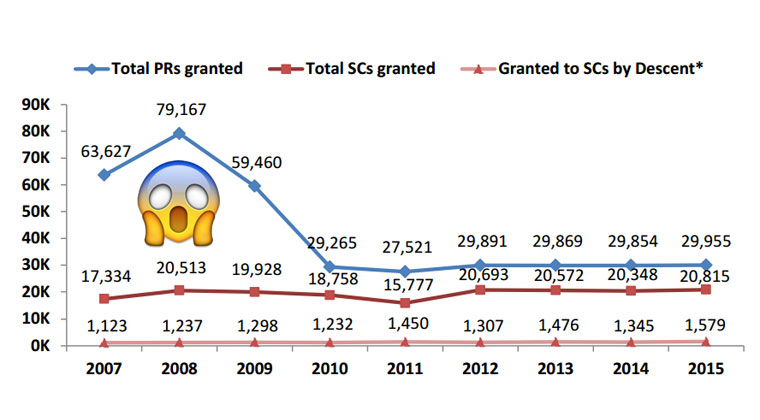Singapore’s population has hit 5.61 million in June 2016.
And to help mitigate the shrinking size and ageing profile of Singapore’s citizen population, the government will continue to grant between 15,000 and 25,000 new citizenships each year.
These statistics are according to the annual Population in Brief 2016 report released on Sept. 27 by the National Population and Talent Division (NPTD).
So what about permanent residence?
Check out the blue line in the graph above from page 15 of the report.
It shows exactly the number of PRs granted by Singapore over the last nine years.
The clear spike in the 2007, 2008 and 2009 years proved so unsustainable it contributed significantly to the paroxysm of political enlightenment in the 2011 General Election.
To help put things in perspective, in those three years of free-wheeling liberal immigration policy from 2007, 2008 to 2009, a total of 202,254 PRs were accepted.
In the following six years, in 2010, 2011, 2012, 2013, 2014 and 2015, Singapore accepted a total of 176,355 PRs.
Therefore, what is taking us about seven years currently was achieved in three years previously. And then some.
A more sustainable increase
Singapore's current approach to granting PRs is more calibrated and scaled down vastly.
The report said permanent residence is an intermediate step through which suitable foreigners and spouses take up citizenship in Singapore.
These new citizens have family ties with Singaporeans or have either studied, worked or lived here for a period of time.
Since the tightening of the immigration framework in late 2009, Singapore has accepted about 30,000 new
PRs a year.
This keeps the PR population stable and ensures a pool of suitable candidates who are familiar and committed to Singapore who may be considered for citizenships.
The majority of our PRs are in the prime working ages of 25-49 years.
Related articles:
S'pore population hits 5.61 million as of June 2016
S’pore to continue to grant 15,000 to 25,000 new citizenships each year
S’pore is going to grow old faster than any society in the world
If you like what you read, follow us on Facebook and Twitter to get the latest updates.
If you like what you read, follow us on Facebook, Instagram, Twitter and Telegram to get the latest updates.
